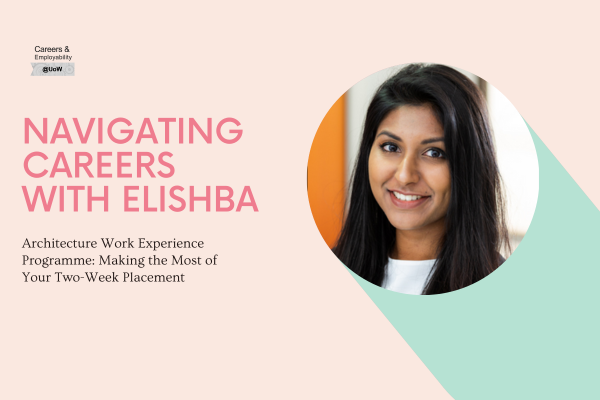Welcome back to the next blog from the Careers Insights with Elishba, this time focusing on placements. If you haven’t read the first article, find it on here.
Each year, our students from the School of Architecture and Cities studying BA Architecture, BSc Architectural Technology, and BSc Architecture and Environmental Design are individually matched by the DCDI Work Placement Team to an Architectural Practice in the London/Greater London area. The placement is full time for two weeks, a mandatory part of the course, and a great way of experiencing the industry first hand.
While it may not sound like much time to find your bearings and get stuck in, with a bit of preparation and planning you can feel confident walking into practice, knowing exactly what you will be taking from the two-week experience.
I would like to share seven of my very own top tips along with those from students I have encountered coming back from work experience, about how to make the most of your short-term Architecture Work Experience.
- Research the Practice
Familiarise yourself with the current/past projects, their expertise, i.e. residential or commercial buildings, landscaping or urban development etc; their news, competitors, financial information. This will enable you to find your feet quickly when assisting on projects, and also give you a better understanding of what you would like to specialise in or experience in the future.
But researching the practice isn’t all about the practical work, it’s about looking into the company values, culture, their corporate social responsibility (how the practice is giving back socially and environmentally), and their stance on equality, diversity, and inclusion. This will help you gain a feel for how you might relate and resonate with the practice and start considering what you would like to look for in a practice in the long run and why.
2. Prepare your CV and Portfolio
As part of the work placement, we ask that your practice comments on your CV and provides you with feedback, so it is a good idea to have prepared an up to date CV. You can also request feedback on a portfolio from your allocated supervisor. Remember, requesting feedback from an industry expert will provide you with a more specific opinion that can only be valuable and beneficial to your future applications within the industry. Don’t miss the opportunity to do so!
3. Make a note of what you’re hoping to gain from the experience
This will help you establish a focus for the two weeks and will fill you with a sense of accomplishment at the end. For example, you could make a note of your goals for week one and goals for week two, and they could be anything from contributing to a discussion to learning AutoCAD. The progress you will have made will then support you in the remainder of your studies, as well as in the next internship or full time role.
4. Create a Journal
Journalling your daily experience is a fantastic way of processing all that you are learning and experiencing. Spend 5-10 minutes at the end of each day to jot down what you did throughout the day; any projects you helped with, your specific role, the skills you were utilising or developing, any problems or issues you helped to resolve. As you do this, other thoughts and ideas will be sparked and before you know it you will have created a comprehensive list of examples that you can add to your CV or use in future interviews.
5. Get Involved
For some, this one may require pushing yourself to step out of your comfort zone and into the limelight. Be proactive and your confidence will follow. Volunteer for as many tasks as possible, regardless of what interests you and what doesn’t as you never know what you might actually enjoy doing. This will also help you learn more about yourself as well as the work, as you become aware of your particular strengths and weaknesses and start thinking about how you can utilise your strengths and improve your weaknesses. Not to mention, getting involved will leave a great and lasting impression on your practice.
6. Request Feedback
Ask your supervisor/line manager about how you are performing or performed on a particular task. Show initiative and request a catch up at the end of each day to discuss how it went for the both of you and ask for positive feedback as well as what you could have done better. This will enable you to feel confident in doing what you are doing well and start improving on areas that aren’t your strengths.
7. Network
Perhaps one of the most crucial parts of the experience, and certainly one benefit I find most students feeding back on after placement. Introduce yourself to as many people as possible, start conversations and ask lots of questions; questions about their job, their own career journey and choices, and about the practice. Make the most of this opportunity while you are there and follow up with adding contacts to your LinkedIn and stay in touch; you don’t know who a useful contact at any given time of your own career might be.
Feel free to connect with me on LinkedIn and if you have any work experience or internship related queries, or questions regarding the Architecture two-week placement, please email the DCDI Team on DCDIPlacements@westminster.ac.uk.
- How my Internship changed my Career path. - 9 October 2025
- Are you trying to find a part-time job? - 2 October 2025
- Using Gamification to Sharpen Your Career Skills - 2 October 2025
